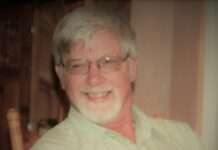By Ron Wilson, director of the Huck Boyd National Institute for Rural Development at Kansas State University.
Let’s go to the Pentagon. Here on a desk is a personalized mug from a pottery studio halfway across the country in rural Kansas. It’s the classic type of stoneware pottery that has been made for centuries.
Steve and Jane Fry are owners of Elk Falls Pottery, the source of this personalized mug. Jane grew up near Hesston and Steve came from Great Bend in Barton County. As a teenager, Steve and his friends rode motorcycles in a nearby area they called the clay pits, where a local brick company had mined for clay.
Steve was always interested in art. At Hesston College he took a sculpture class and then was introduced to pottery. The professor took the students on a field trip to a high quality clay deposit in Barton County.
The professor taught them the art of making pottery. “I fell in love with clay and the potter’s wheel,” Steve said. He also met Jane and fell in love with her. They were married after college.
Steve and Jane learned about a living history village in Georgia which recreated life in 1850. They took positions at the village, with Jane serving as a hostess and Steve becoming an apprentice potter. He learned to use a treadle wheel to throw the clay forms. “It was a great experience,” Steve said.
By 1976, they wanted to set up a potter’s studio of their own. They spotted a magazine ad which described an affordable place in the southeast Kansas town of Elk Falls and ultimately moved there. Elk Falls Pottery was born.
Elk Falls Pottery offers handmade dense, durable stoneware such as serving platters, bowls, and other dinnerware. The business grew and so did the family. Steve and Jane had a daughter and son, now grown with spouses and children.
To get clay, Steve goes to the same high quality clay deposits which his professor had shown him, near where he had ridden his motorcycle years before in Barton County. Over time, he developed his own recipe to blend with the clay to make an ideal product.
Steve uses the wheel to form the stoneware. Jane does trimming, staining, glazing and adds decorations, lettering or logos. “We work as a team,” Jane said.
The items are fired twice. First is a bisque firing to 1,940 degrees which causes the clay to harden but remain porous for glazing, followed by a second firing to 2,300 degrees which matures the clay and melts the glaze into a smooth finished surface.
One year Steve and Jane learned about the Walnut Valley bluegrass Festival at Winfield. They attended and noticed there were craft vendors present. “Let’s make some customized mugs and bring them to sell next year,” Steve said. The following year, he brought 15 mugs – and they were so popular that he took orders for 89 more!
Eventually, festival staff asked them to make a limited edition souvenir mug for the festival. This became a popular annual tradition. “We had people waiting in line for us to unload the mugs at the festival,” Steve said. The Walnut Valley Festival has become their biggest sales event, although they stay busy throughout the year.
Today, Elk Falls Pottery makes thousands of mugs and other stoneware items annually.
“We want to make things that are used by people and are affordable to purchase,” Steve said. Their customized mugs are especially popular.
“We can put a business logo on a mug or put on someone’s name for a birthday, wedding, or anniversary,” Jane said.
Their mugs have literally gone from coast to coast and to such places as the Pentagon, as well as overseas. That’s impressive for a business in the rural community of Elk Falls, population 107 people. Now, that’s rural.
“It’s rewarding to take something all the way from the Kansas raw material to someone’s finished product,” Steve said. For more information, go to www.elkfallspottery.com.
It’s time to leave the Pentagon, where we found a stoneware mug from rural Kansas. We salute Steve and Jane Fry of Elk Falls Pottery for making a difference with rural craftsmanship that lasts.
Audio and text files of Kansas Profiles are available at http://www.kansasprofile.com. For more information about the Huck Boyd Institute, interested persons can visit http://www.huckboydinstitute.org.
The mission of the Huck Boyd National Institute for Rural Development is to enhance rural development by helping rural people help themselves. The Kansas Profile radio series and columns are produced with assistance from the K-State Research and Extension Department of Communications News Media Services unit. A photo of Ron Wilson is available at http://www.ksre.ksu.edu/news/sty/RonWilson.htm. Audio and text files of Kansas Profiles are available at http://www.kansasprofile.com. For more information about the Huck Boyd Institute, interested persons can visit http://www.huckboydinstitute.org.




